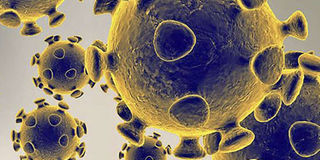WHO: Health workers at risk of inhaling COVID-19 virus during procedures

An illustration image obtained February 27, 2020 courtesy of the US Food and Drug Administration shows the coronavirus,COVID-19. PHOTO | AFP
What you need to know:
Health workers are advised so wear N95 masks because they filter out about 95 per cent of all liquid or airborne particles.
Chances of the virus scientifically known as SARS-CoV-2 surviving in the air will depend on the humidity, temperature among other things.
The World Health Organisation (WHO) has warned that health workers are at more risk of inhaling the Covid-19-causing virus during medical procedures.
While the agency has insisted that the new coronavirus (Covid-19) is not airborne, it has issued a warning to medical staff that the highly contagious virus can likely remain airborne in some places around health facilities.
So rapid and aggressive has the spread of Covid-19 been that scientists have been advising medics and the public to maintain a safe distance between each other and limit their interaction, to stop the spread of the virus.
Already, people have been found to be infected through droplets that are sneezed or coughed out by infected people.
According to scientists, a single cough can produce up to 3,000 droplets, while a sneeze can produce as many as 10,000.
But now the virus SARS-CoV-2, which causes Covid-19 disease, has been found to also lurk in the hospital environment, prompting the WHO to issue a caution to medical staff caring for patients.
“Based on the information received so far and on our experience with other coronaviruses, Covid-19 appears to spread mostly through respiratory droplets (for instance, produced when a sick person coughs) and close contact. Droplets are too large to be airborne for long periods of time, and quickly settle out of air. This is why WHO recommends everyone maintain hand and respiratory hygiene,” said Collins Boakye-Agyemang the communications advisor at WHO, Regional Office for Africa when the Nation sought clarification.
A study released last week found that the virus can remain in the air for up to three hours, Dr Maria Van Kerkhove, an emerging disease expert at the WHO, advised healthcare workers.
According to Mr Boakye-Agyemang, Dr Van Kerkhove’s statement, made on Monday, was meant to guide healthcare providers when they have to use procedures that concentrate the virus particles such as using ventilators to help patient breath which can increase the number of particles of the virus in hospital set-ups exposing the medical provider to the virus and can easily inhale it.
“When you do an aerosol-generating procedure like in a medical-care facility you have the possibility to aerosolise these particles meaning they can stay in the air for a little bit longer. Therefore in this situation it’s imperative for health workers to take additional precautions when working on patients,” Said Dr Van Kerkhove.
However, for the everyday person, she added, it is the talking and the sneezing that exposes you to the virus.
“Which is why we want the respiratory etiquette,” she said.
Health workers are advised so wear N95 masks because they filter out about 95 per cent of all liquid or airborne particles.
There have been conflicting reports on whether the new coronavirus can survive in the air. While some preliminary studies have suggested that it can be aerosolised other researches contradict it, finding no aerosolized coronavirus particles in the hospital rooms of Covid-19 patients.
But the UK Tuesday reported a case of the first victim of hospital-acquired coronavirus fuelling concerns the disease could be spreading within hospitals
“It’s not really airborne. This is because it [the virus] needs to travel inside a droplet which can live for three days on some surfaces, like plastic and steel, depending on how long it takes for the droplet to dry off and eventually be deactivated,” explained Dr Marianne Mureithi, a medical microbiologist.
She further added that the chances of the virus scientifically known as SARS-CoV-2 surviving in the air will depend on the humidity, temperature among other things.
“The colder the air the more time it will take for the droplet to evaporate,” Dr Mureithi said.
WHO officials say the respiratory disease spreads through human-to-human contact, droplets carried through sneezing and coughing as well as germs left on inanimate objects. The coronavirus can go airborne, staying suspended in the air depending on factors such as heat and humidity, they said.
Dr Van Kerkhove said health officials are aware of several studies in a number of countries looking at the different environmental conditions that Covid-19 can persist.
Scientists are specifically looking at how humidity, temperature and ultraviolet lighting affects the disease as well as how long it lives on different surfaces, including steel, she said.





